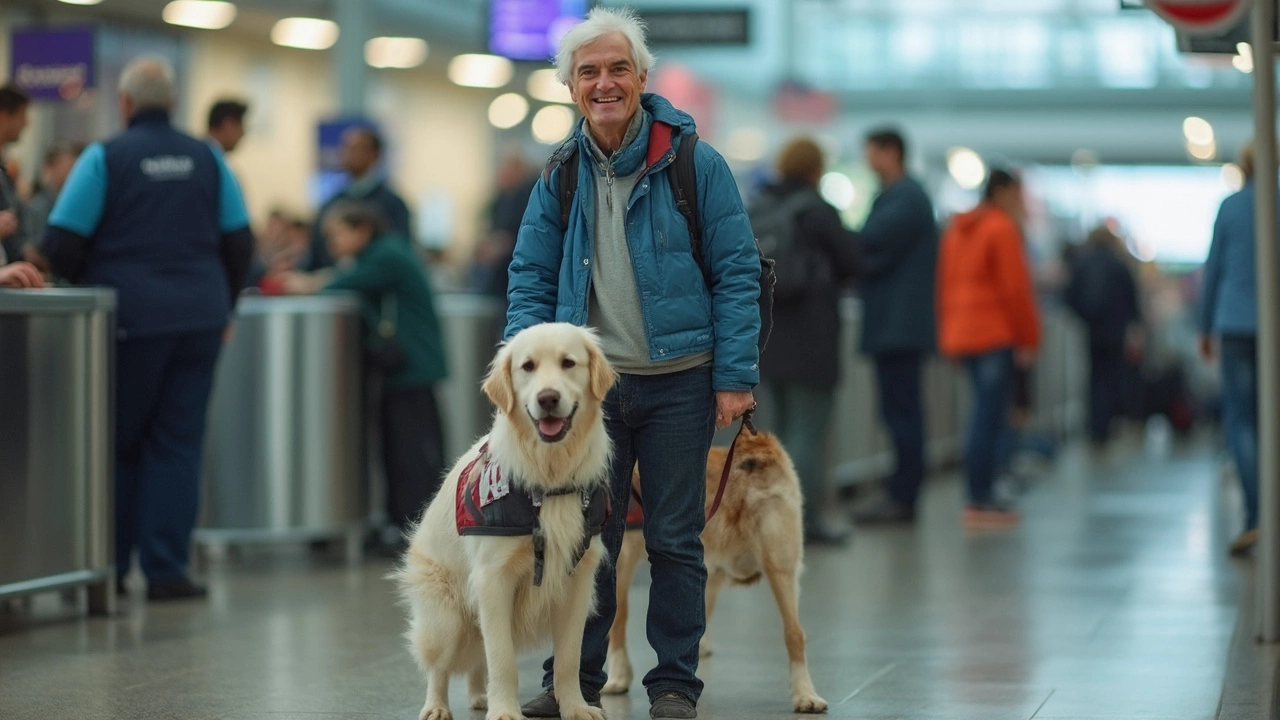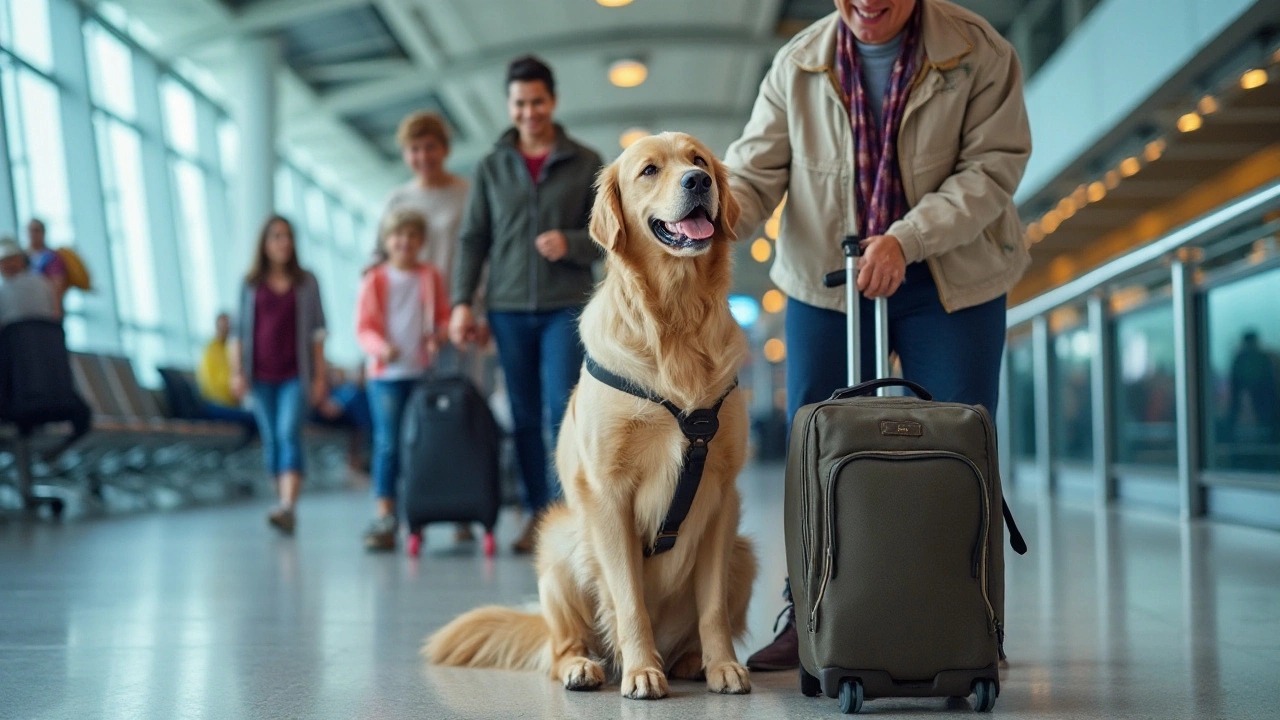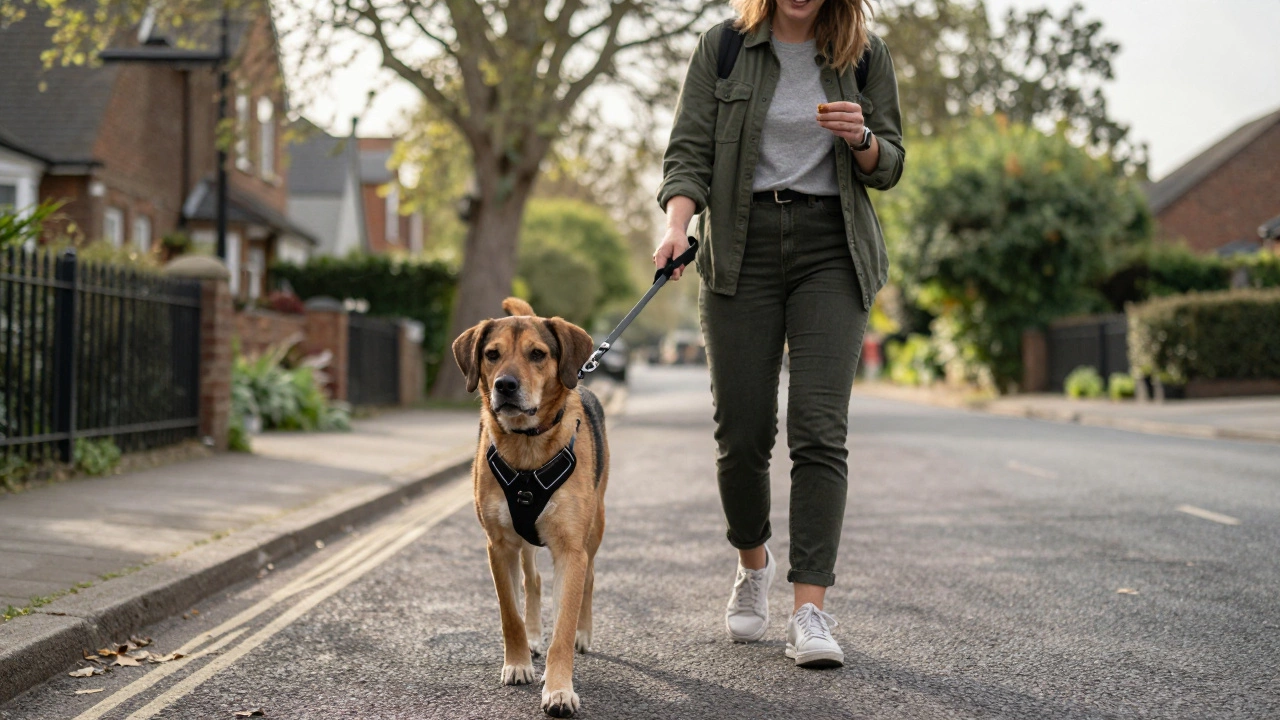Ever been out with your service dog and felt that awkward pause—like someone’s eyeing you up, deciding if you’re “legit”? It happens a lot, especially when you’re traveling. Whether you’re boarding a flight, checking in to a hotel, or just grabbing lunch at a café, the worry always pops up: can someone actually ask to see papers for your service dog?
The short answer: in the U.S., there’s no official paper or ID required for your service dog under the Americans with Disabilities Act (ADA). It surprises a lot of folks, but legally, businesses can’t demand paperwork or proof. They can only ask you two very specific questions: is the dog required because of a disability, and what task has the dog been trained to perform? That’s it—nothing more, nothing less.
Knowing your rights is half the battle. Most people behind the counter aren’t experts in disability law, and can get it wrong. If you’re heading out on a dog-friendly holiday, it pays to be calm, polite, and ready with those simple answers. It can save you a lot of stress, embarrassment, or even being wrongly turned away.
- What Is a Service Dog, Really?
- The Law: Who Can Ask and What Can They Say?
- Dealing with Travel and Accommodation
- Common Misconceptions About Service Dog Papers
- Tips for a Smooth, Paperwork-Free Holiday
What Is a Service Dog, Really?
You’ve probably heard the term tossed around, but what actually counts as a service dog? Not every dog you see in a vest or walking calmly through a store is one. The ADA lays it out pretty clear: a service dog is specially trained to do tasks that help with a person’s disability. We’re not talking about comfort animals or pets who make you feel better just by being around. These dogs actually do stuff—real tasks that their handler can’t do alone.
Here’s what sets a service dog apart from other pups:
- Service dog: Task-trained to assist someone with a disability (like guiding someone who’s blind or alerting a person having a seizure).
- Emotional support animal: Offers comfort just by being present, but isn’t trained to perform specific tasks.
- Therapy dog: Visits hospitals or schools to boost morale, but isn’t tied to one person or any disability.
Under the ADA, only dogs (and in rare cases, miniature horses) qualify as service animals. And yes, the training can take months or even years. These animals learn to ignore distractions, respond to cues, and help with everything from picking up dropped keys to opening doors for wheelchair users.
A lot of people guess about how many service dogs are out there. In the U.S., it’s estimated there are around 500,000—helping folks with a range of needs, including mobility challenges, diabetes, epilepsy, autism, and PTSD.
| Type of Service | What the Dog Does |
|---|---|
| Guide Dog | Leads visually impaired people |
| Hearing Dog | Alerts deaf or hard-of-hearing handlers to sounds |
| Medical Alert Dog | Warns of seizures, low blood sugar, or other medical events |
| Mobility Dog | Provides stability or retrieves objects |
| Psychiatric Service Dog | Interrupts anxiety attacks or PTSD episodes |
So if your dog is trained to do a specific job that helps with your disability, you’re on solid ground. But if they just make you feel good without doing any tasks? That’s not covered under “service dog” for legal travel rights.
The Law: Who Can Ask and What Can They Say?
Here’s where it gets real. In the U.S., the Americans with Disabilities Act (ADA) is the law that covers the rules for a service dog. Not every random person can quiz you or demand proof about your dog. Only staff at a business, government building, airline, or housing provider are allowed to ask you anything—and even then, the law keeps it tight.
They're allowed to ask only these two questions, word for word:
- Is your dog required because of a disability?
- What work or task has your dog been trained to perform?
That’s it. They aren't allowed to grill you about your actual condition. They can’t ask you to show the dog doing the task, and they definitely can’t ask for certification or medical documents. No need for vests, badges, or paperwork, either. Seriously, under ADA, there’s no official government certification for service dogs in the U.S.—despite all those fancy-looking vests and online ID sites.
Here’s a common slip-up hotels and restaurants make: asking for "papers." If anyone pushes for documents, you don’t have to provide them. You can politely explain that ADA law bans that—they can only ask the two allowed questions. Sometimes staff just aren’t trained, so staying calm and knowing the law helps smooth things out.
Airlines (under the Air Carrier Access Act) used to have their own forms, but rules changed in 2021. Now, airlines can require a Department of Transportation service animal form for flights, but nothing more. Always double-check with the airline, as their process can differ—don’t just show up and hope for the best.

Dealing with Travel and Accommodation
Once you start planning a trip with your service dog, things get real. Rules can shift a bit depending on airlines, hotels, rental cars, or even campgrounds. The big one to remember—the service dog has federal legal protection under the ADA, but not every employee you meet will know the law by heart.
At airports and on U.S. airlines, you can’t be forced to show papers for your service dog. In 2021, the U.S. Department of Transportation made it official: emotional support animals aren’t covered under the same rules, but trained service dogs are. Some airlines may hand you a form to sign, mainly so they have something on file stating your dog really is a service animal. But still, you’re not required to have any government-issued ID, registration, or doctor’s letter if you’re flying domestically.
- Hotels and motels (under the ADA): Can’t charge you a pet fee or ask you for documentation, but they can ask those same two standard questions.
- Airbnb and VRBO: These private rentals technically aren’t fully covered by ADA, but most larger hosts still try to stick with ADA spirit. It pays to message the host in advance—just skip the paperwork talk and focus on tasks the dog’s trained for.
- International travel: Totally different game. Plenty of countries will want vet paperwork, proof of vaccinations, maybe a quarantine period. Always check embassy or government websites of the country you’re visiting.
Here’s a snapshot of what different travel spots might ask for in the U.S.:
| Location/Service | Can Ask for Papers? | Notes/Extra Steps |
|---|---|---|
| U.S. Airlines | No | May ask you to confirm by form or at check-in |
| Hotels/Motels | No | Pet fees don’t apply, can ask about tasks only |
| Restaurants | No | Should allow, but dog can be asked to leave if disruptive |
| Airbnb/VRBO | Rarely | Not fully covered by ADA, so ask host first |
| International Border | Yes | Proof of shots, health certificate usually required |
If you hit a snag, keep it simple: restate your answers to the two legal questions. If someone won’t budge, don’t cause a scene. Ask (calmly) for a manager or ADA coordinator. Sometimes just mentioning “ADA” is enough to jog a memory and get things moving smoothly. Keep your cool—most people are just trying to protect their company from breaking rules, not hassle you personally.
Common Misconceptions About Service Dog Papers
So many travelers run into the same headaches: someone at a hotel desk or gate insists you must show official "service dog papers." There’s a lot of bad info floating around. Here’s what’s actually true (and what isn’t).
First, the service dog “certification” you see sold online is mostly meaningless. The ADA, which covers disability rights all across the U.S., doesn’t recognize any special registry or ID card for service dogs. You don’t need a vest, an official-looking badge, or a pile of paperwork. Buying one of those cheap certificates online won’t give you extra rights, and it often just wastes your money.
Let’s clear up some more of these myths with quick facts:
- No U.S. state or national agency issues official service dog paperwork.
- There’s no legal requirement to “register” your service dog anywhere.
- Businesses can’t demand medical proof of your disability or ask your dog to demonstrate its task.
- Emotional support animals (ESAs) are different—hotels and businesses don’t have to allow them under ADA rules.
Here’s a quick comparison of what people think is required versus what’s actually true:
| Myth | Reality |
|---|---|
| You must show paperwork/ID for your service dog. | No paperwork is needed by law; only two questions are allowed. |
| All assistance animals have the same rights as service dogs. | Only dogs trained for specific tasks (not ESAs) get ADA protection. |
| Online registries make a dog legally a service dog. | No government recognizes these registries as official or required. |
If a business tries to insist on paperwork, chances are they just don’t know the rules. Sometimes carrying a simple ADA info card or keeping the ADA.gov link handy on your phone helps settle things fast, but you’re not legally required to show a single document.
With so many services hyping "official service dog paperwork," it’s easy to get tripped up. Bottom line: for your rights and your wallet, skip the scams and know the real law.

Tips for a Smooth, Paperwork-Free Holiday
Traveling with your service dog should be easy, not a legal showdown every time you check in somewhere or walk through a lobby. The trick is to show confidence and stay a step ahead, without ever needing to flash unnecessary papers. Here’s how to keep things breezy:
- Know the ADA’s Limits: Legally, in the U.S., you’re never required to show paperwork for your service dog. Instead, staff can only ask two things: "Is this a service dog required for a disability?" and "What task does your dog perform?" End of story.
- Keep Answers Short and Clear: When you’re asked, answer smoothly and confidently. No need to overshare—just stick to the basics. For example, “He helps alert me before I have seizures.”
- Pack Helpful Stuff (Optional): You don’t have to, but things like a vest that says “Service Dog” or a simple card citing ADA guidelines can cut down awkward conversations. These are not required by law, but they help avoid hassle with folks who might not be clued in.
- Spot the Red Flags: Some places outside the U.S.—like hotels in Europe—can, and will, ask for different certifications or even pet fees. Double-check before you go if you’re heading abroad.
- Never Pay Registration Scams: There are shady websites selling “official” registration for big bucks. That’s not real. The U.S. government doesn’t issue any service dog IDs, period.
Here’s a quick cheat sheet to keep handy. Whether you’re flying, driving, or just chilling at a resort, these facts set things straight:
| Situation | Can They Ask for Papers? | What Can They Ask? |
|---|---|---|
| U.S. Hotels | No | Disability & task |
| Restaurants | No | Disability & task |
| Domestic Flights (U.S.) | Sometimes (airlines may have their own forms) | Disability & task; may need DOT form |
| International Travel | Maybe | Depends on country—check rules ahead |
Want a painless, paper-free trip? Save the ADA’s website link on your phone so you can show it if staff get pushy. And remember, staying polite and calm—even when someone’s clueless—usually gets the best results. Your dog’s job is hard enough; your job should be enjoying your holiday without drama.







